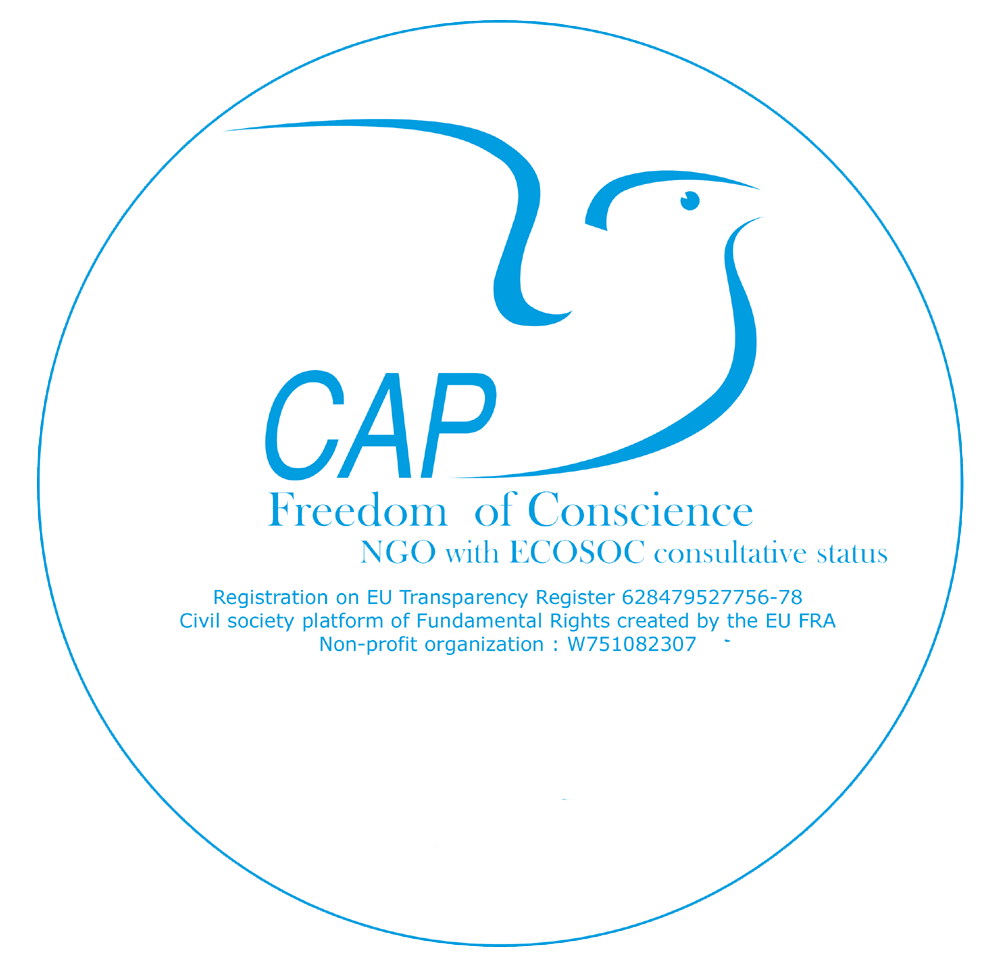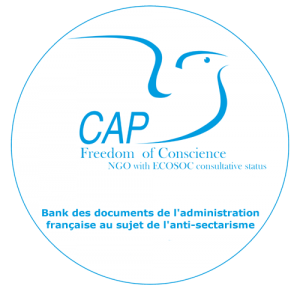A side event held during the 58th Session of the United Nations Human Rights Council, Geneva, on 26th March 2025 drew urgent attention to systemic human rights violations in Pakistan, focusing particularly on religious persecution, education policy, and the use of European Union development instruments.
The event, titled “Human Rights in Pakistan: Education Under Siege – Ideology, Intolerance, and the Erosion of Human Rights in Pakistan,” was organised by the French NGO CAP Liberté de Conscience, Human Rights Without Frontiers (HRWF), and Global Human Rights Defence (GHRD).
Ms Christine Mirre, Director of CAP Liberté de Conscience, moderated the event and opened with a reminder of the NGO’s 25-year-long commitment to defending fundamental rights and religious freedom. “We have worked for years on the issue of religious persecution in Pakistan, particularly the targeting of the Ahmadiyya Muslim community,” she stated. “Today’s discussion aims to examine how state policy, educational systems, and ideological indoctrination intersect to threaten freedom of conscience.”
The keynote address was delivered by Mr Ján Figeľ, former EU Commissioner and first European Union Special Envoy for the promotion of freedom of religion or belief outside the EU. Figeľ underscored the centrality of religious liberty within the broader human rights framework.
“Freedom of religion or belief is not just one right among many—it is central to human dignity and a litmus test for the protection of all other rights,” he said.
Figeľ highlighted the EU’s significant trade relationship with Pakistan under the GSP+ scheme. “Pakistan is the largest beneficiary of GSP+ preferences, yet there has been little improvement in human rights. The EU must reassess the cost of it’s silence.”
He also called for the reform of EU education support, stating: “Financial assistance to discriminatory or extremist educational content must be halted. Promoting segregation from childhood undermines peace, justice, and inclusion.”
Mr Willy Fautré, Director of Human Rights Without Frontiers, presented a comprehensive analysis of the EU’s GSP+ mechanism and education sector funding in Pakistan. “Between 2016 and 2024, the European Union has spent upwards of €150 million on education in Pakistan. Yet this investment supports a system where non-Muslim children face exclusion, and extremist clerics dictate curricula,” he said. “Parliamentary questions have been raised, but the Commission’s responses have lacked transparency and accountability.”
Fautré cited multiple reports and incidents. “In Punjab, a professor was forced to publicly renounce teaching Darwin’s theory after threats from clerics. This is not education—it is ideological coercion. The EU’s credibility is at stake.”
He concluded by urging, “If Europe is to remain a human rights actor, it must ensure that public funds do not enable the erosion of pluralism and academic freedom.”
Mr Anwar Mehmood Rehman, a Swiss-based Ahmadiyya Muslim politician and human rights activist, gave a deeply personal account of persecution faced by the Ahmadiyya community in Pakistan. “Ordinance XX criminalises our identity. We cannot call ourselves Muslims, vote, or hold public office. This is state-sanctioned exclusion,” he said. “Children are taught in schools that Ahmadis are liars or infidels. My own father, a doctor serving the poor, was killed by a student radicalised by such teachings.”
Rehman appealed to international institutions to act decisively. “We call for the repeal of blasphemy laws and for Pakistan to meet its obligations under international human rights conventions,” he said. “It is not enough to express concern. We need protection, recognition, and reform—without delay.”
Ms Inna Chefranova, Executive Director of the European Facilitation Platform, spoke on the plight of minority girls subject to forced conversion and marriage. “The problem of forced religious conversion is systemic, not incidental. It is enabled by a curriculum that marginalises non-Muslim identities and presents Islamic supremacy as a norm,” she explained. “Cases such as that of 13-year-old Arzoo Raja, who was abducted, converted and married to an older man, illustrate the failures of Pakistan’s judiciary and education system.”
Chefranova linked these abuses to international trade and aid mechanisms. “The EU cannot continue to provide GSP+ privileges while systemic abuse persists. Monitoring without enforcement fails victims.” She added, “Education should be a tool of inclusion, not indoctrination. Until reforms are implemented, support should be conditional on measurable progress.”
A recorded message from Mr Bert-Jan Ruissen, Member of the European Parliament and Co-Chair of the Intergroup on Freedom of Religion or Belief, was also played. “We fund education in Pakistan, yet we disavow responsibility for what that education teaches,” he said. “That is unacceptable.”
In response to a recent question from Ruissen to the European Commission the latter confirmed that EU taxpayers’ money had been provided to “religious seminaries”. This is taken to refer to madrassas, where young boys are radicalised, and where much of the leadership of the Taliban were “educated.”
Ruissen called for parliamentary action. “The EU must integrate these concerns into the upcoming GSP+ review. We cannot subsidise hate and exclusion.”
The event closed with a statement by Fautré summarising the panel’s recommendations. “We urge the United Nations and European institutions to require legal and curricular reforms in Pakistan, protect educators and students from coercion, and ensure aid aligns with international norms,” he said. “Education must empower—not divide.”
The event was well-attended by diplomats, NGOs, and members of civil society, and concluded with a brief Q&A session. Participants highlighted a consensus that conditionality, accountability, and transparency must underpin future EU engagement with Pakistan, especially in light of the upcoming GSP+ review in 2025.
Media coverage
Forced Conversions in Pakistan Highlighted at UN Human Rights Council Side Event
https://eurofacilitation.eu/forced-conversions-in-pakistan-highlighted-at-un-human-rights-council-side-event.htm
Pakistan EU funding of Pakistan’s questionable school education system
https://www.eureporter.co/world/pakistan/2025/03/27/eu-funding-of-pakistans-questionable-school-education-system/
Geneva Conference Highlights Religious Persecution and Education Crisis in Pakistan
https://eutoday.net/geneva-conference-persecution-pakistan/
PAKISTAN: About the misuse of EU taxpayers’ money to finance “dubious” school programs
https://hrwf.eu/pakistan-about-the-misuse-of-eu-taxpayers-money-to-finance-controversial-school-education-programs/
PAKISTAN: About the misuse of EU taxpayers’ money to finance “dubious” school programs
https://hrwf.eu/pakistan-about-the-misuse-of-eu-taxpayers-money-to-finance-controversial-school-education-programs/
Forced Conversions in Pakistan Highlighted at UN Human Rights Council Side Event
https://questcomms.eu/2025/03/28/forced-conversions-in-pakistan-highlighted-at-un-human-rights-council-side-event/
Videos :
EU Today interview with Mr Anwar Mehmood Rehman, a Swiss-based Ahmadiyya Muslim politician
https://www.youtube.com/watch?v=nVBEZLLOEJo
EU Today interview with Mr Ján Figeľ, former EU Commissioner, and Mr Willy Fautré, Director of HRWF
https://www.youtube.com/watch?v=zmqUjjLySEY
Keynote Address by Ján Figeľ – Religious Freedom and EU-Pakistan Relations
https://www.youtube.com/watch?v=rGwMKZZlVqU
EU Funding, Human Rights, and Education in Pakistan: A Critical Analysis by Willy Fautré
https://www.youtube.com/watch?v=rGwMKZZlVqU
Persecution of the Ahmadiyya Community in Pakistan: Testimony by Anwar Mehmood Rehman
https://www.youtube.com/watch?v=wKPTvqgTLSQ
Systemic Human Rights Violations in Pakistan: Address by Inna Chefranova at UN Side Event
https://www.youtube.com/watch?v=wEmNZBJvHMw






